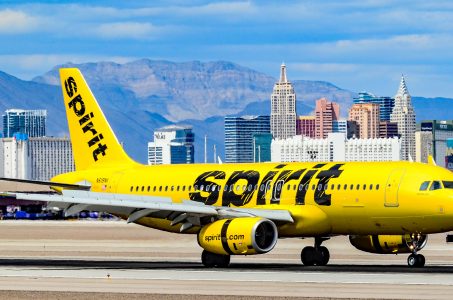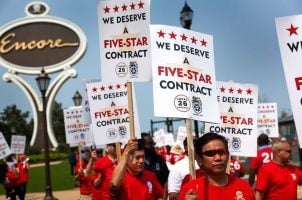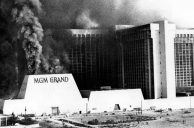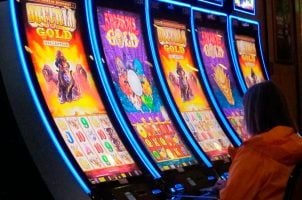Las Vegas Valley Casino-Dependent Economy Sees 9.9 Percent Unemployment
Posted on: March 20, 2021, 11:56h.
Last updated on: March 21, 2021, 01:04h.
Las Vegas Valley’s hospitality- and gaming-reliant economy saw an unemployment rate of 9.9 percent in January. That was the second-highest of all the large US metro areas measured, according to recently released data.

New numbers from the US Bureau of Labor Statistics (BLS) show progress has been made in Las Vegas, given the economic downturn caused by the COVID-19 pandemic.
“The unemployment rate in Las Vegas is working its way lower,” Stephen M. Miller, director of UNLV’s Center for Business and Economic Research, told Casino.org on Saturday. By contrast, Las Vegas’ unemployment rate reached 33 percent last April.
“Once we get control of the virus, our economy should spring to life and a robust recovery should ensue,” Miller predicts. “Pent-up demand for a vacation may lead to an overshoot in the short run. That is, we could see a short-run expansion of significant size.”
The new BLS data also revealed that the Salt Lake City region saw the lowest unemployment in January among US large metro areas — 3.5 percent.
“We were in the Salt Lake City range on unemployment rates before the pandemic hit,” Miller said about Las Vegas. “We can go there again.
“But it will take some time. We must conquer the virus first.”
Coronavirus Vaccinations Continue
For now, Southern Nevada is in a “race to vaccinate a significant portion of the population,” Miller added. “The downside risk is that too few people get vaccinated and/or the coronavirus variants take hold and our recovery is aborted.”
In addition, Southern Nevada includes tourists who likely visit for a short period and then leave. That makes “us more vulnerable to the virus,” Miller added.
As of Thursday, Nevada had vaccinated 678,481 residents for coronavirus with either one or two shots, according to the Nevada Health Response website.
Of those who got a shot, 378,965 are considered having completed their vaccines. These residents either had the one-dose vaccine or both of the doses for the two-shot vaccine.
Also, there have been 300,951 confirmed coronavirus cases as of Friday in the state since the outbreak began last year. There were 5,171 cumulative fatal cases.
Recent economic data also show how much of southern Nevada is reliant on one sector of the economy: leisure and hospitality, Miller said.
He explained that the Las Vegas Valley relies on sectors of the economy that require “face-to-face contact for economic activity …. [That] caused our downturn to be more severe than most other metro areas.”
Tale of Two Cities
Also, when comparing Reno and Las Vegas, it becomes “a tale of two cities,” Miller said. Reno already diversified its economy from leisure and hospitality sectors.
Reno therefore was not hurt as much as Las Vegas in the coronavirus-related downturn, Miller added.
“It will be a much heavier lift to diversify Las Vegas,” Miller predicts. Las Vegas represents about 74 percent of Nevada’s economy, and Reno is approximately 15 percent.
In the case of Las Vegas, Strip casinos reported gross gaming revenue (GGR) of $3.73 billion in 2020. That represents the lowest haul since 1999.
Nevada Gov. Steve Sisolak (D) ordered the state’s casinos to close their operations in mid-March of 2020. They remained shuttered until early June because of the risk from COVID-19. More recently, casino floors saw occupancy capped.
By way of contrast, January’s BLS data also showed the unemployment rate in the Los Angeles area was 11.5 percent. That was the highest unemployment of all US metro regions measured.
“California experienced renewed shutdowns in December and their unemployment rates, including Los Angeles, rose significantly,” Miller said. “Las Vegas and Nevada do not want to go down that road.”
Related News Articles
PlayUp’s Pending License Denial in Ohio May Lead to Other Issues
Encore Boston Harbor Avoids Strike, Reaches Union Contract
Most Popular
This Pizza & Wings Costs $653 at Allegiant VIP Box in Vegas!
Sphere Threat Prompts Dolan to End Oak View Agreement
Fairfax County Officials Say No NoVA Casino in Affluent Northern Virginia
Atlantic City Casinos Experience Haunting October as Gaming Win Falls 8.5%
Most Commented
-
VEGAS MYTHS RE-BUSTED: Casinos Pump in Extra Oxygen
— November 15, 2024 — 4 Comments -
VEGAS MYTHS RE-BUSTED: The Final Resting Place of Whiskey Pete
— October 25, 2024 — 3 Comments
















No comments yet